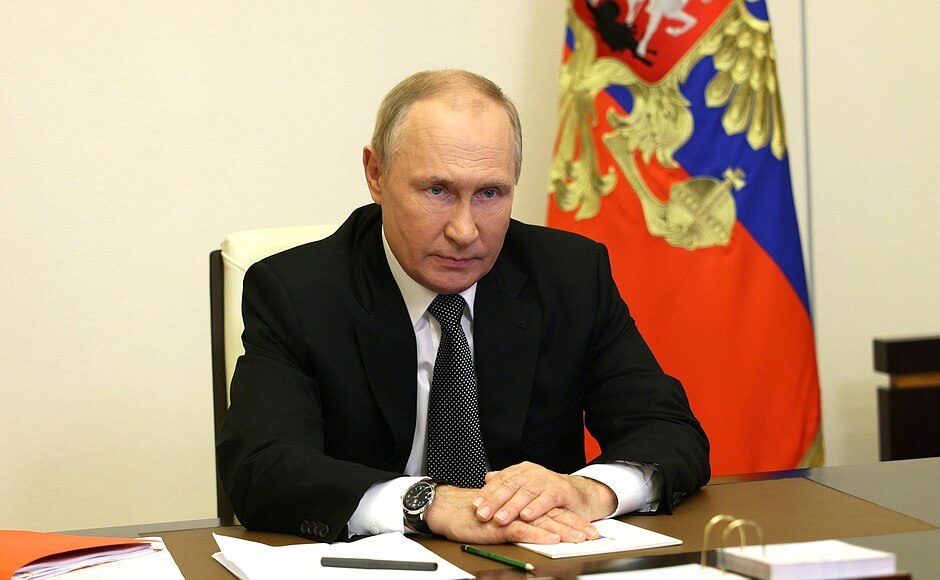On Wednesday, Russian President Vladimir Putin declared martial law in the four Russia-occupied regions of Ukraine—Donetsk, Luhansk, Kherson, and Zaporizhzhia—starting Thursday.
Saying that martial law was already in effect in the four regions before they were annexed, Putin said during a security council meeting on Wednesday: “The Kyiv regime refused to recognise the will and choice of the people, declining any proposals for talks.” He accused Ukraine of “using plainly terrorist methods, plotting sabotage at critical infrastructure, [and] attempting to murder members of local authorities.”
Kremlinologists will note that Gerasimov and Zolotov, who aren't permanent security council members, are there, and Shoigu – who is a permanent member – is not.
— max seddon (@maxseddon) October 19, 2022
“We are working to resolve highly complicated, large-scale challenges related to ensuring the security and reliable future of Russia,” Putin claimed, adding, “Those who are now at the front or undergoing training at training grounds and centres should feel our support and know that they are backed by a huge and great country, by a united and closely-knit people.”
As per the decree, all Russian regions will be under varying levels of “readiness” in order to mobilise the economy, defend territories against natural and man-made emergencies, and meet the needs of the Russian forces and population. In this respect, he announced a special coordinating council led by Prime Minister (PM) Mikhail Mishustin that is designed to “secure the supply and repair of weapons, military and special equipment, material, medical and sanitary services, repairs and restoration, construction, installation and other works, and logistics.”
The Kremlin's actual decrees go much further than Putin let on in his speech (as usual) on martial law, outlining sweeping new security measures, movement restrictions, vehicle checks and wholesale "economic mobilisation" across much of western & southern Russia
— Jake Cordell (@JakeCordell) October 19, 2022
“Federal ministries and departments and regional authorities should meet the requirements of our Armed Forces in a clear-cut and well-coordinated manner,” Mishustin said during a meeting with deputy PMs later on Wednesday. Putin also emphasised that the entire public administration would be involved in meeting the needs of the Ukraine war. The executive order also mentioned that Crimea, Krasnodar, Belgorod, Bryansk, Voronezh, Kursk, Rostov, and Sevastopol will have measures a level below that of martial law.
He asked the Defence Ministry, Interior Ministry, Federal Security Service, Federal Service of National Guard Troops, Chief Directorate for Special Programmes of the Russian President, and the Ministry for Civil Defence, Emergencies and Disaster Relief to submit “proposals on measures to be applied in the regions where martial law has been introduced” within three days.
Putin 🇷🇺 implemented martial law, in the occupied territories, so he can better control the population, use them as human shields to slow Ukraine’s 🇺🇦 advance, and so he can conscript (unwilling) Ukrainian 🇺🇦 men to go die as cannon fodder.
— Jason Jay Smart (@officejjsmart) October 19, 2022
He also gave “additional powers” to the heads of all of Russia’s 80-plus regions to ensure the “safety of people, the security and counterterrorism protection of critical infrastructure facilities, maintain public order, enhance the stability of the economy and industry, as well as launch and increase the manufacturing of products necessary for the special military operation.”
The Ukrainian Ministry of Foreign Affairs said the new measure is aimed at “suppressing the resistance of the residents of Luhansk, Donetsk, Zaporizhzhia and Kherson regions, who oppose the Russian occupation,” and that it is “unable to disguise the failure of Russia’s efforts to annex Ukrainian territories.” Calling the decree “null and void” with “no legal consequences” for Ukraine, the foreign ministry affirmed, “Ukraine will continue liberating occupied territories and rescuing its people.”
"Martial law" implementation on the occupied territories by RF should be considered only as a pseudo-legalization of looting of Ukrainians’ property by another "regrouping". This does not change anything for Ukraine: we continue the liberation and deoccupation of our territories.
— Михайло Подоляк (@Podolyak_M) October 19, 2022
During his nightly address, Ukrainian President Volodymyr Zelensky cautioned the people in the Russian-occupied regions, saying, “In the near future, the occupiers will try to recruit men into their army. […] Please avoid it as much as you can. Try to leave the occupied territory.”
United States (US) President Joe Biden, meanwhile, said that Putin is in a “difficult position” and that “it seems his only tool available is to brutalise Ukrainian citizens to try to intimidate them into capitulating. They’re not going to do that.”
Likewise, in an interview with ABC News, US Secretary of State Antony Blinken noted, “In saying that he’s [Putin] declaring martial law in places that he claims to have people who somehow want to be part of Russia, that speaks to his desperation.”
Meanwhile in Russia: anger and disappointment fill the studio, as the viewers are being prepared for the loss of Kherson and other territories. Host Olga Skabeeva bitterly questions why Russia was so wrong in the beginning, believing that Zelensky would run & NATO wouldn't help. pic.twitter.com/sQpxokXDSv
— Julia Davis (@JuliaDavisNews) October 19, 2022
Against this backdrop, Russia is trying to evacuate 60,000 people from the city of Kherson amid fear of an intensified attack by Ukrainian forces. Russian military commander Sergei Surovikin has warned that “difficult decisions” might be necessary, a possible reference to Russian forces retreating from the region. However, pro-Russian Kherson Governor Vladimir Saldo asserted, “Nobody is going to give away Kherson. The military will fight to the death.”
Martial law empowers Russian authorities to impose curfews, travel and residence restrictions, military censorship, and various other measures.

